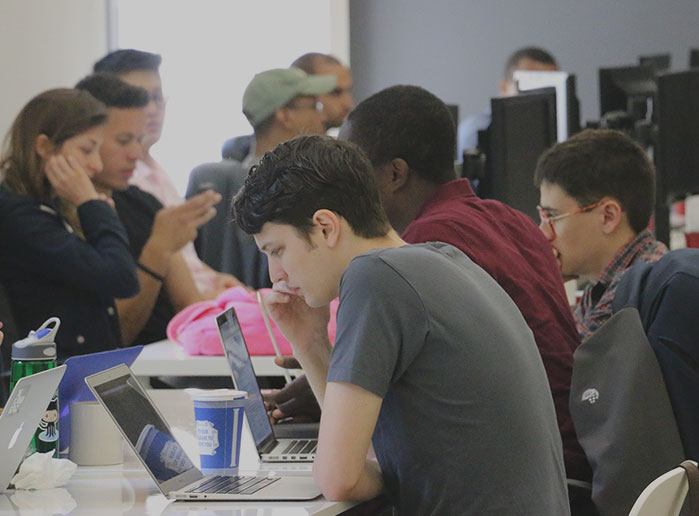When you think of the “typical” programmer, which adjectives come to mind?
Probably something along the lines of analytical, focused, methodical, logical, and mathematical—in other words, left-brain characteristics.
You’re probably not thinking inventive, creative, adaptive, communicative, passionate, or curious.
But maybe you should be. Programming is actually an awesome profession for those in the humanities—including artists, musicians, writers, lawyers, and scholars—since it requires all of those traits. Check out the six traits creative people possess that make them awesome programmers.
Inventiveness
“[Software engineering] is perhaps the most creative field imaginable,” says one Quora user. “It’s just your thoughts and a screen waiting to be filled with code. In that screen you can create anything.”
In other words, writing code is comparable to composing music or writing. Being able to create beautiful solutions (yes, beautiful!) is the hallmark of a great developer.
As product innovation lead Assaf Weinberg explains, “Every time a developer writes code, he is taking a non-deterministic path towards an unknown solution — a unique solution that has never been created before. If the work weren’t unique, he wouldn’t need to write it, he’d simply copy and paste it.”
Creativity
If you’re creative, you’ve probably noticed your ability to draw connections between seemingly unrelated things. Believe it or not, this ability is incredibly valuable to developers: you’ll be able to get inspiration from unlikely sources and apply it to your work.
Dubious? In this blog post, software developer Alan Skorkin shares some of the random insights he’s had and what they’ve led to—like an application to manage all of his passwords. Note that Skorkin wrote this in 2008, the same year password manager platform LastPass was founded. (LastPass is currently valued at more than $10 billion.)
The point is, getting inspired and turning your thoughts into something real—an experience that every creative person knows intimately—is also a huge component of software development.
Adaptiveness
These days, most teams follow the Agile principles of software development—which creative people happen to be perfectly suited for.
After all, Agile teams are highly flexible and iterative. They work in short work cadences (called “sprints”), which actually look pretty similar to the bursts of inspiration most creatives get. Sprints usually last 30 days and are highly focused on one or two goals. Once the sprint is over, everyone gets together, figures out if they’re still on the right track, and then decides what to work toward during the next sprint.
If you’re not adaptive, this process will probably feel pretty uncomfortable. Luckily, creatives excel at constantly shifting gears and responding to new feedback and information.
Communication Skills
If you’re coming from a creative profession, you’ve probably got a lot of practice articulating your thoughts and ideas—and that’ll make you an invaluable member of any tech team.
For instance, imagine that you need to explain to a client why their request isn’t a good idea. Being able to take a complex concept and relay it in simple language will make you much more persuasive; as a result, the client probably won’t push back (or as much.)
Or, maybe a fellow developer asks you to explain a potentially controversial programming decision you made. If you can clearly walk her through your reasoning, you’ll avoid conflict.
Writing skills are also crucial. Without solid documentation for your code, for example, it’ll be hard for your team members (not to mention anyone who works on the code in the future) to add to or update it. That’s one reason many programmers maintain active technical blogs, sharing their challenges and solutions with an engaged community of fellow coders. This not only aids in learning, but helps build communication skills for the modern workplace and beyond.
Passion
Meeting a creative person who treats his or her job like a 9-5 is pretty rare. Most creatives throw themselves into their work, getting not just enjoyment but also energy from what they’re doing.
The tendency to immerse yourself in your work is invaluable in programming. The best software developers don’t just think about their code when they’re physically in the office: they’re constantly turning it over in their minds, brainstorming ways to make it better and more efficient.
And of course, they’re excited by what they do. The majority of programmers have worked on tons of side projects and GitHub repositories, which shows that to them coding is far more than just a way to make money.
Curiosity
Those in the creative professions usually have curiosity in spades. As cognitive scientist Joel Chan explained, “Creativity requires attention: Both for focusing in deep work and sustaining oneself through thick and thin to finish the creative work, and for flexibly searching in memory and one’s environment for crucial clues to the puzzle.”
Being motivated to find an answer is a fantastic quality in a programmer: It’ll help you engineer solutions to even the trickiest problems. Plus, curiosity drives you to learn and explore. There’s a ton of information and resources out there for engineers, from books and podcasts to meetups and conferences. While it’s definitely possible to be a good developer without taking advantage of this extra knowledge, people who do progress much faster.
Now that you know how creative skills contribute to programming, you probably won’t be surprised to learn that many Flatiron students come from backgrounds in art, music, writing, linguistics, law—and we’re looking for more! We just partnered with Course Report to offer a full scholarship to our immersive web development course in NYC for people with non-technical backgrounds. Check out the details and apply here.
This post was written by Aja Frost, who covers business, tech, productivity, and careers.
Written byFLATIRON SCHOOL
Make yourself useful.

